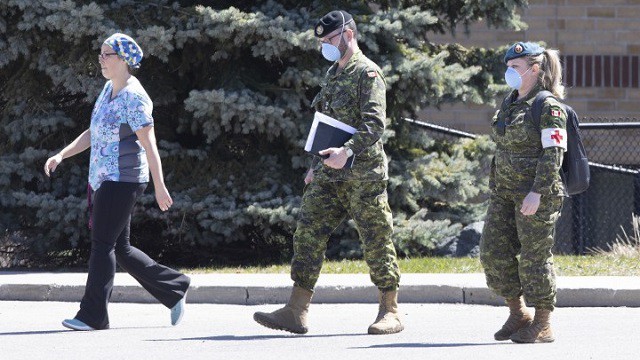Military says still ‘minor’ problems in some Ontario long-term care homes
Published August 15, 2020 at 1:14 pm

The Canadian Armed Forces says minor problems remain in some Ontario long-term care homes they were deployed to earlier in the COVID-19 pandemic.
But critics say this does not mean the homes have a clean bill of health.
The military’s concerns outlined in a report dated Aug. 4 and released Friday include worker skills and standards of practice in the seven nursing homes.
The reports attributes many of the problems to inexperienced staff who were quickly pressed into service in the homes during the pandemic.
Ontario called in the military to seven homes that struggled to deal with COVID-19 outbreaks starting in April.
Weeks later, the Forces said they observed cockroach infestations, aggressive feeding that caused choking, bleeding infections, and residents crying for help for hours.
The Ministry of Long-term Care says all of the homes were stablized by the time the soldiers left in July.
“In short, I believe Ontario is well equipped to address any of these issues from this point forward,” Brig.-Gen. C.J.J. Mailkowski said in the report.
The military was initially called in to assist at Orchard Villa in Pickering, Altamont Care Community in Toronto, Eatonville Care Centre in Toronto, Hawthorne Place in Toronto and Holland Christian Homes’ Grace Manor in Brampton.
It was later also deployed to Downsview Long Term Care in Toronto and Woodbridge Vista Care in Woodbridge, Ont.
“There remain a small number of observations related to clinical skills and standards of care — often connected to training, expertise, and experience with new staff who were mobilized in short order — that were identified,” Mailkowski said.
“In every case, once identified … management, staff, and linked hospital team resolved to correct the issue within the resources available.”
NDP long-term care critic Teresa Armstrong said while a number of issues have been addressed, there are still serious problems in the homes.
“When Ontarians need to know if long-term care is ready for a second wave, (Premier Ford is) putting families at the back of the line to see the Canadian Armed Force’s exit report, and trying to present it — and the crisis in long-term care — as if all problems have been fixed,” she said in a statement.
Armstrong also criticized the report’s release late on a Friday afternoon.
“(Ford’s) lack of transparency is disturbing, and exactly why we need an independent public inquiry into long-term care,” she said.
Vivian Stamatopoulos, an associate professor at Ontario Tech University specializing in family caregiving, said the military is trying to put the “best face” on chronic problems that remain in these homes as they wrap up their mission.
The report shows incorrect charting, lack of some medical supplies, and some instances of improper handling of residents is still going on in the homes, she said.
“I mean these are not minor issues,” she said. “These are things they noticed that are problems, but obviously they had to leave so they’re unresolved. I don’t know how those are going to be monitored in their absence.”
Stamatopoulos said the government should not take the report as a sign that problems across the sector, laid bare by the pandemic, are resolved.
“This is just a snapshot of some of the problems and that’s when they had significant help in there,” she said. “What about all the homes that didn’t have the help that are still struggling.”
The province says it will share the report with a commission it has established to probe the long-term care sector in the coming months.
“We welcome their observations, which will help us in our ongoing work to strengthen the long-term care sector,” Long-Term Care Minister Merrilee Fullerton said.
In June, Ombudsman Paul Dube started an investigation into the province’s pandemic oversight of long-term care homes because of what he read in a recent military report.
As of Friday, 1,800 residents in Ontario’s long-term care homes and eight workers have died of COVID-19.
Shawn Jeffords, The Canadian Press
INsauga's Editorial Standards and Policies








